
All categories
Featured selections
Trade Assurance
Buyer Central
Help Center
Get the app
Become a supplier

(538 products available)



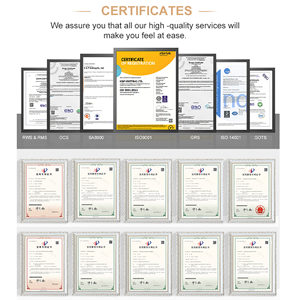











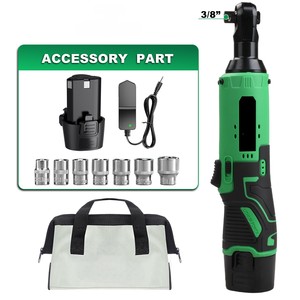

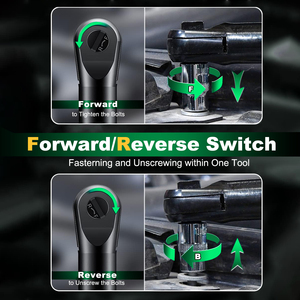




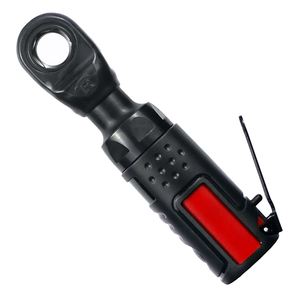


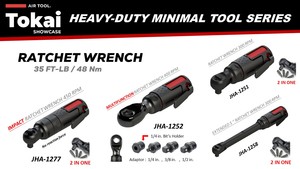
Thru hole air ratchet wrenches come in different types, each suited for specific applications based on factors such as torque requirements, operating pressure, and the tasks' intricacy. Some of these may include the following.
The standard thru hole ratchet wrench is designed for basic tasks and moderately heavy duty. It features a straightforward ratchet mechanism that allows for quick fastening or loosening of nuts and bolts. These are most commonly used in assembly lines mechanical repairs, and in other general industrial applications. They offer decent torque and are compatible with any air pressure and a few other limits.
Requirements High torque thru hole air ratchet wrenches are designed to provide operations with high levels of torque. These wrenches are regarded as being suitable for use in very tough jobs, especially in thick materials where extra twisting power is required, such as heavy engineering or construction works. Their high torque ratio makes them suitable for critical situations where lower torque tools would easily slip or malfunction.
Reversible Air rachets have a feature that allows the direction of tightening and loosening of bolts to be changed. This function comes in handy when one is required to work on one fastener from multiple angles. Mainly, these tools are used in automobile repairs, maintenance work, and other assembly jobs where space may be limited to around a few rotating movements only.
Cordless electric ratchets are battery-operated versions of traditional pneumatic ratchets. While they do not have the thru-hollow design, they offer greater flexibility without the need for an air compressor. These are ideal for light to moderate tasks in areas with limited access to air power. They are useful and effective in small jobs requiring a moderate amount of torque and convenience.
Thru-hole pneumatic ratchet wrenches have extensive usage across industrial applications due to their efficiency in operations that require a level of precision and speed. The following are some of the most popular fields.
One of the most common industries in which pneumatic ratchets are used is the automotive industry. They are used to accomplish different tasks like wheel fastening, engine component assembling, and bodywork repairs. The thru hole design allows for extra flexibility in the usage of these tools in constrained engine areas, making them a critical component for auto mechanics working with lubrication required for long term use.
The aerospace industry requires high precision and light weight. Thru hole pneumatic ratchets are used in assembling aircraft components and systems where space is a premium. Their ability to work in tight spaces and ensure accurate torque application makes them essential tolls for aerospace engineers. The intakes also ensure they do not add much weight to the components.
Manufacturing industries also extensively use air ratchets in automating assembly lines. These tools speed up the fastening process and improve efficiency in mechanical assembly. In addition, the pneumatic wrenches help to reduce fatigue among workers and make it easier for them to carry on with their work for longer periods as they do not require as much physical effort as manual tools.
Ratchets are used to maintain and repair heavy machinery and equipment used in many construction, mining, and agricultural industries. Thru hole pneumatic ratchet wrenches can deliver the required torque while also being used to access hard target areas on large machines and thus make them appropriate for multitasking. Their durability and power suit them for this use.
This feature allows the wrench to drive a socket through an object, providing access to fasteners in deep or recessed areas. It adds versatility and makes the tool ideal for complex tasks.
Thru-hole pneumatic ratchet wrenches are powerful and efficient. The compressed air operation provides a high power-to-weight ratio, making it ideal for heavy-duty tasks.
An ergonomically designed handle ensures a comfortable grip during prolonged use. Reduced vibration and improved handling lead to less user fatigue.
The wrench produces a substantial torque, enabling the user to quickly tighten or loosen even the most stubborn fasteners. This feature reduces time in tasks requiring high torque.
An automatic clutch and ratchet gear system enable smooth and quick socket changes without manual adjustments. This feature enhances productivity due to its quick flick in operation.
An adjustable exhaust directs air away from the user and the work area. Proper adjustment helps reduce debris and noise, improving working conditions.
These are the following important specifications to consider.
This is why buyers should consider additional parameters like these before purchasing a Thru hole air ratchet wrench, as there is a wide variety available.
Considering the application space, the pneumatic wrench's space condition should also be considered. For example, a mini pneumatic ratchet wrench is most suitable for working in the narrowest inaccessible zones. On the other hand, larger ones are more effective in open workplaces.
Auto mechanics should consider auto repair garages and auto part stores as potential clients. These industries specifically use these tools for fasteners in hard-to-reach locations in automobiles.
Buyers should consider the level of torque required in their industries. A high torque pneumatic wrench should be used in those industries that frequently work with thick materials, as this will improve the pneumatic ratchet's working speed.
Inconvenience materials used to make pneumatic ratchets, such as chromium and vanadium steel or aluminium alloys, are resistant to corrosion. These are the strongest and lightest to enhance strength and durability further.
Since a pneumatic ratchet needs a compressor to operate, a buyer should consider the kind of air compressor that would match the wrench in pressure and volume. A mismatch would mean inefficient tool use.
The compressors should also have good noise abatement mechanisms, as pneumatic tools can generate significant noise levels for comfort and hearing protection.
As stated earlier, pneumatic ratchets are so powerful that they can be used almost anywhere. They can be used anywhere in the auto industry, aerospace industry, and manufacturing industry. In fact, they are the ones that are mostly used in industries that require strength and precision. Nevertheless, there are pneumatic ratchets for car repairs, such as those built for lightweight materials, while there are heavy-duty ones for industries like construction, such as those built for heavy materials.
It can, especially in heavy industries where an electric ratchet or manual one has been used. Manual and electric ratchets are not as powerful as pneumatic ones. However, pneumatic tools aren't always portable because they require a supply of air. In such a case, electric and manual ratchets are more practical options as they can be used nearly anywhere.
The ratchet, especially the pneumatic one, is rare in home workshops simply because it requires an air supply. They are mostly found in large-scale industries because they offer a heavy-duty racheting tool. The cost of equipment is another reason why home workshops don't use pneumatic ratchets.
It does not require any specific air compressor. However, there are some pneumatic ratchets whose performance will be guaranteed if they are paired with specific pneumatic compressors in terms of pressure and volume. A compressor that does not match the ratchet will result in inefficient functioning.